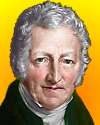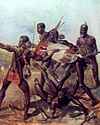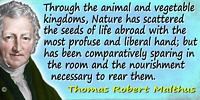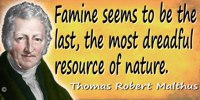 (source)
(source)
|
Thomas Robert Malthus
(13 Feb 1766 - 23 Dec 1834)
English economist and demographer who published his theories, an early systematic analysis of human society, in An Essay on the Principle of Population. He quantified the rates of increase of population versus food supply, and the consequences.
|
Thomas Robert Malthus
“The prodigious waste of human life”
Illustrated Quote - Medium (500 x 250 px)
More Thomas Robert Malthus quotes on science >>
Thomas Malthus first published his famous essay in 1798, in a nineteen chapter book titled An Essay on the Principle of Population.
In Chapter III, Malthus compared the savage or hunter state, the shepherd state, and the tribes of barbarians that overran the Roman Empire. He begins, “In the rudest state of mankind, in which hunting is the principal occupation, and the only mode of acquiring food; the means of subsistence being scattered over a large extent of territory, the comparative population must necessarily be thin.” However, “whenever any of the tribes happen to settle in some fertile spot, and to draw nourishment from more fruitful sources than that of hunting; and … adopted a more easy and civilized mode of life, [then] one woman has reared five or six, or more children; though in the savage state, it rarely happens, that above one or two in a family grow up to maturity.” Thus “the effort towards population” can outpace the agricultural means to support it.
As population increased, “A wider and more extensive territory was successively occupied.” This resulted in emigration, and upon reaching a territory of competing tribes,there would be a contest in “a struggle for existence,” in which “death was the punishment of defeat, and life the prize of victory.” Mathus continues:
“[p.48] In these savage contests many tribes must have been utterly exterminated. Some, probably, perished by hardship and famine. Others, whose leading star had given them a happier direction, became great and powerful tribes; and, in their turns, sent off fresh adventurers in search of still more fertile seats.
The prodigious waste of human life occasioned by this perpetual struggle for room and food, was more than supplied by the mighty power of population, acting, in some degree, unshackled, from the constant habit of emigration.
The tribes that migrated towards the South, though they won these more fruitful regions by continual battles, rapidly increased [p.49] in number and power, from the increased means of subsistence. Till, at length the whole territory, from the confines of China to the shores of the Baltic, was peopled by a various race of Barbarians, brave, robust, and enterprising; inured to hardship, and delighting in war. Some tribes maintained their independence. Others ranged themselves under the standard of some barbaric chieftain, who led them to victory after victory; and what was of more importance, to regions abounding in corn, wine, and oil, the long wished for consummation, and great reward of their labours. An Alaric, an Attila, or a Zingis Khan, and the chiefs around them, might fight for glory, for the fame of extensive conquests; but the true cause that set in motion the great tide of northern emigration, and that continued to propel it till it rolled at [p.50] different periods, against China, Persia, Italy, and even Egypt, was a scarcity of food, a population extended beyond the means of supporting it.”
After two more pages developing these thoughts, Mathus concludes the chapter by writing:
“…it must be acknowledged, I think, that the commission of war is vice, and the effect of it misery; and none can doubt the misery of want of food.”
- Science Quotes by Thomas Robert Malthus.
- 13 Feb - short biography, births, deaths and events on date of Malthus's birth.
- Thomas Robert Malthus - context of quote “Famine … the most dreadful resource of nature.” - Medium image (500 x 250 px)
- Thomas Robert Malthus - context of quote “Famine … the most dreadful resource of nature.” - Large image (800 x 400 px)
- Thomas Robert Malthus - context of quote “Food is necessary to…existence ” - Medium image (500 x 250 px)
- Thomas Robert Malthus - context of quote “Food is necessary to…existence ” - Large image (800 x 400 px)
- Thomas Robert Malthus - context of quote “Population…increases in a geometrical ratio” - Medium image (500 x 250 px)
- Thomas Robert Malthus - context of quote “Population…increases in a geometrical ratio” - Large image (800 x 400 px)
- Thomas Robert Malthus - context of quote “Nature has scattered the seeds of life” - Medium image (500 x 250 px)
- Thomas Robert Malthus - context of quote “Nature has scattered the seeds of life” - Large image (800 x 400 px)
- Thomas Robert Malthus - context of quote “The prodigious waste of human life” - Large image (800 x 400 px)









